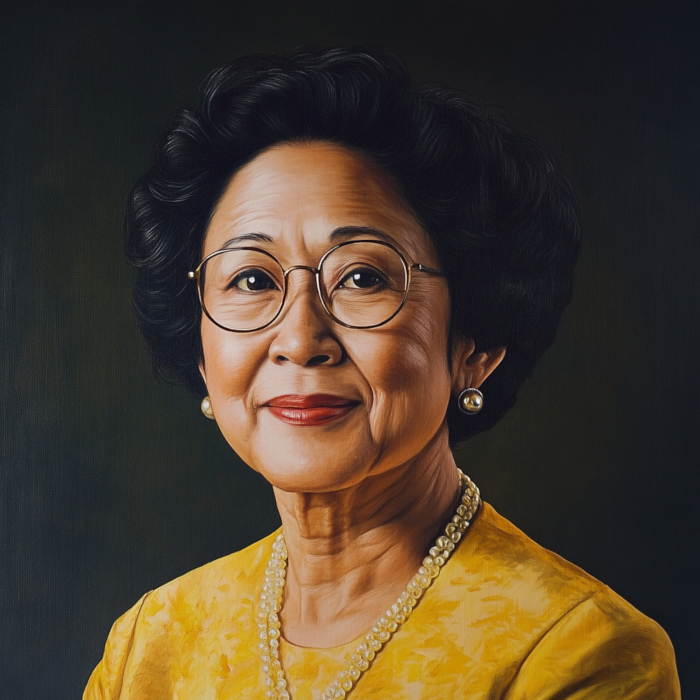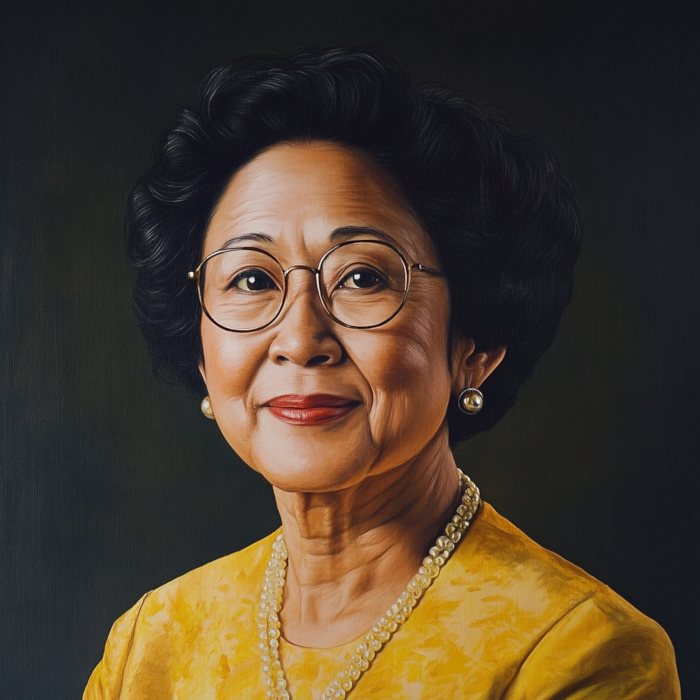


Corazon "Cory" Aquino (1933–2009) was the 11th President of the Philippines and the first woman to hold this office, serving from 1986 to 1992. She is best known for leading the People Power Revolution that ousted the dictatorship of Ferdinand Marcos and restored democracy in the Philippines. A political outsider before the assassination of her husband, Benigno "Ninoy" Aquino Jr., Cory Aquino became the symbolic leader of the anti-Marcos opposition. Her presidency was a period of democratic transition marked by political instability, economic challenges, and significant constitutional reforms. Despite these challenges, Aquino is revered as a symbol of democracy, moral leadership, and peaceful resistance to authoritarianism.
Birth and Family Background: María Corazón Sumulong Cojuangco was born on January 25, 1933, in Paniqui, Tarlac, Philippines, into one of the country’s most prominent and wealthy families. Her father, José Cojuangco, was a successful businessman and politician, while her mother, Demetria Sumulong, came from an influential political family. Cory grew up in a privileged environment, surrounded by political and social elites.
Education: Cory was educated in private Catholic schools in the Philippines before continuing her studies abroad. She attended Ravenhill Academy in Philadelphia and Notre Dame Convent School in New York City, and later completed a degree in French and Mathematics at Mount Saint Vincent College in New York. Although Cory was an academic achiever, she lived a quiet and reserved life, largely avoiding the political limelight.
Marriage to Ninoy Aquino: In 1954, Cory married Benigno "Ninoy" Aquino Jr., a charismatic journalist and politician who would go on to become one of the most prominent opposition leaders against the dictatorship of Ferdinand Marcos. The couple had five children, including Benigno "Noynoy" Aquino III, who would later become the 15th President of the Philippines. Cory largely stayed out of the public eye during the early years of their marriage, supporting Ninoy’s political career and raising their family.
Ferdinand Marcos’ Martial Law (1972): In 1972, President Ferdinand Marcos declared martial law in the Philippines, which allowed him to rule by decree, suppress political opposition, and crack down on dissent. Ninoy Aquino, who had become Marcos’ most prominent political rival, was arrested and imprisoned for nearly eight years. During this time, Cory Aquino assumed the role of a supportive wife, advocating for her husband's release and keeping his political legacy alive while raising their children.
Exile and Assassination of Ninoy Aquino: In 1980, Ninoy Aquino was allowed to go into exile in the United States after suffering a heart attack in prison. The Aquino family settled in Boston, where they lived for three years. In 1983, Ninoy decided to return to the Philippines to challenge Marcos and reignite the opposition movement. On August 21, 1983, Ninoy was assassinated at Manila International Airport (now Ninoy Aquino International Airport) upon his return. His assassination became a pivotal moment in Philippine history, sparking widespread protests against the Marcos regime.
From Housewife to Opposition Leader: After the assassination of her husband, Cory Aquino was thrust into the political spotlight. Initially reluctant to enter politics, she soon became the symbolic leader of the anti-Marcos movement. Her status as a widow and her soft-spoken, moral demeanor contrasted sharply with the authoritarian image of Marcos. Cory’s leadership helped unite the fragmented opposition, which had grown increasingly vocal after Ninoy’s death.
1986 Snap Election: In response to growing unrest and international pressure, Marcos called for a snap presidential election in February 1986, hoping to legitimize his rule. Reluctantly, Cory Aquino accepted the opposition's call to challenge Marcos in the election. Her candidacy was seen as a moral and symbolic choice, representing the desire of the Filipino people for change. The election was marred by widespread fraud and violence, with both Marcos and Aquino claiming victory. Despite official results declaring Marcos the winner, independent observers, including the Catholic Church and international groups, declared the election fraudulent.
People Power Revolution (1986): Following the contested election, mass protests erupted in the Philippines. Millions of Filipinos gathered along Epifanio de los Santos Avenue (EDSA) in Manila in what became known as the People Power Revolution. The peaceful, non-violent uprising, supported by the Catholic Church, military defectors, and civil society groups, led to Marcos fleeing into exile in Hawaii on February 25, 1986. On the same day, Corazon Aquino was sworn in as the 11th President of the Philippines, marking the end of the Marcos dictatorship and the beginning of a new democratic era.
Restoring Democracy and Constitutional Reform: One of Aquino’s first major acts as president was to dismantle the authoritarian structures of the Marcos regime and restore democratic institutions. She established a provisional government and oversaw the drafting of a new constitution. The 1987 Constitution of the Philippines, ratified by a national plebiscite, restored civil liberties, human rights, and checks on executive power. It established a presidential system, a bicameral legislature, and an independent judiciary, and set term limits for elected officials.
Coup Attempts and Political Instability: Aquino’s presidency was marked by significant political instability, with numerous attempts to overthrow her government. Between 1986 and 1989, she survived at least seven coup attempts, most of which were led by factions within the military loyal to Marcos or discontented with Aquino’s leadership. These coups, while unsuccessful, exposed the fragility of Aquino’s government and the divisions within the military.
Economic Challenges: The Philippines faced severe economic problems when Aquino took office, including massive foreign debt, unemployment, and poverty. Aquino’s administration sought to restore investor confidence, tackle corruption, and rebuild the economy. Although there were some successes, particularly in restoring democratic governance, the economy remained sluggish, and many of the structural issues inherited from the Marcos era persisted. Aquino’s government also dealt with natural disasters, such as the 1989 earthquake and the 1991 eruption of Mount Pinatubo, which further strained the economy.
Land Reform and Social Justice: One of the key issues during Aquino’s presidency was land reform. The Comprehensive Agrarian Reform Program (CARP) was introduced in 1988 with the goal of redistributing agricultural land to tenant farmers. However, the program faced significant resistance from landowners and was criticized for its slow implementation and numerous loopholes. Aquino’s family, the Cojuangcos, owned large tracts of agricultural land, including the Hacienda Luisita, which made her administration’s commitment to land reform a controversial issue.
Peace and Internal Conflicts: Aquino also faced internal security challenges from communist insurgents (the New People's Army) and Muslim separatists in Mindanao. Her administration sought to negotiate peace agreements with these groups, but the insurgencies persisted throughout her presidency. The Aquino government made some progress in establishing dialogues, but peace remained elusive.
Peaceful Transition of Power: In 1992, after serving a six-year term, Cory Aquino peacefully stepped down from office, respecting the limits set by the new constitution. Her decision to relinquish power voluntarily was seen as a triumph for democracy and helped set the tone for future transitions of leadership in the Philippines. She was succeeded by Fidel V. Ramos, her former defense secretary, whom she had endorsed as her successor.
Post-Presidency Activism: After leaving office, Aquino continued to play an active role in Philippine politics and civil society. She remained an influential figure, supporting democratic institutions and speaking out against corruption and authoritarian tendencies in subsequent governments. She was particularly critical of Joseph Estrada, whose administration was marred by corruption scandals. Aquino was a key figure in the EDSA II uprising in 2001, which led to Estrada’s ouster.
Mother of Democracy: Cory Aquino is often referred to as the "Mother of Philippine Democracy" for her role in restoring democratic institutions after years of authoritarian rule. Her presidency, while challenged by economic and political instability, is remembered for her moral leadership and her commitment to democratic governance. She provided a symbol of hope for the Filipino people, proving that peaceful resistance could overcome dictatorship.
Death and National Mourning: Corazon Aquino died on August 1, 2009, after a battle with colon cancer. Her death prompted an outpouring of national grief, with tens of thousands of Filipinos paying tribute to her legacy. Her funeral was attended by many political leaders, and her passing was seen as the end of an era in Philippine history. Aquino's life and work continue to be honored in the Philippines, and she remains a symbol of democracy and peaceful change.
Benigno "Noynoy" Aquino III’s Presidency: Cory Aquino’s son, Benigno "Noynoy" Aquino III, was elected president of the Philippines in 2010. His presidency was widely seen as a continuation of his parents' legacy of reform, good governance, and anti-corruption efforts. Noynoy Aquino’s administration focused on economic reforms, anti-corruption measures, and efforts to combat poverty. His election reaffirmed the Aquino family's significant role in Philippine politics.
Continuing Influence: The Aquino family remains an influential political dynasty in the Philippines, associated with democracy, reform, and good governance. Cory Aquino’s personal humility, devout Catholic faith, and dedication to peaceful resistance left an enduring mark on Philippine society and politics.
Corazon Aquino’s life and presidency symbolize the power of moral courage and peaceful resistance in the face of dictatorship. She led the Filipino people in their fight for democracy and became a symbol of hope, integrity, and reform. Her presidency restored democratic institutions, introduced a new constitution, and set the Philippines on a path toward recovery after years of authoritarian rule under Ferdinand Marcos. Though her administration faced significant challenges, Cory Aquino is remembered as the "Mother of Philippine Democracy" for her role in ending martial law and restoring the country’s democratic institutions. Her legacy continues to inspire those who fight for justice, freedom, and democracy around the world.

We use cookies
We use cookies and other tracking technologies to improve your browsing experience on our website, to show you personalized content and targeted ads, to analyze our website traffic, and to understand where our visitors are coming from. Privacy Policy.